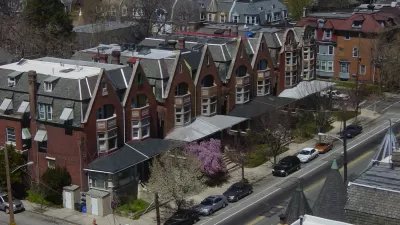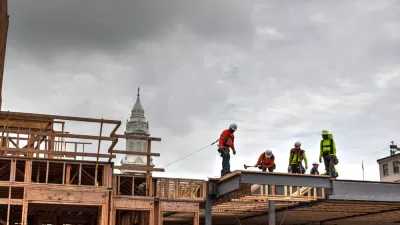Qualifying developments are eligible for a ten-year tax abatement in Philadelphia. These op-ed authors say the abatement doesn't work as anything other than a government payout.
Ira Goldstein, president of Policy Solutions, and Emily Dowdall, chief of development and policy implementation at the Reinvestment Fund, write a guest opinion piece for the Philadelphia Inquirer:
Philadelphia’s 10-year tax abatement is fundamentally a tax expenditure: not the benign concept of “money we never had” but more like writing a check from the city to the developers or buyers of new or substantially rehabilitated properties. Extreme cases such as abating $2 million townhouses prompt us to ask: Is this a wise expenditure for the city or school district?
The opinion piece was prompted by news of a luxury townhome development, each of the ten units expected to sell for $2 million, that would receive the tax abatement. "Assume an average price for these townhouses of $2 million per unit and that 20 percent of the $2 million is the value of the land for which tax will be owed; $1.6 million per unit will be exempt from the Philadelphia real-estate tax," explain Goldstein and Dowdall. "The city’s annual tax expenditure per unit will be $23,315 per unit (with the proposed 2019 tax rate of 1.4572)."
The writers present their argument against the abatements by refuting a series of arguments in favor of the abatements—i.e., the market requires stimulation, the abatement lowers the cost of construction, and it's an investment that eventually yields more revenue.
FULL STORY: Let's cap Philly's 10-year tax abatement to be fair to all

Planetizen Federal Action Tracker
A weekly monitor of how Trump’s orders and actions are impacting planners and planning in America.

Congressman Proposes Bill to Rename DC Metro “Trump Train”
The Make Autorail Great Again Act would withhold federal funding to the system until the Washington Metropolitan Area Transit Authority (WMATA), rebrands as the Washington Metropolitan Authority for Greater Access (WMAGA).

The Simple Legislative Tool Transforming Vacant Downtowns
In California, Michigan and Georgia, an easy win is bringing dollars — and delight — back to city centers.

Albuquerque’s Microtransit: A Planner’s Answer to Food Access Gaps
New microtransit vans in Albuquerque aim to close food access gaps by linking low-income areas to grocery stores, cutting travel times by 30 percent and offering planners a scalable model for equity-focused transit.

This City Will Pay You to Meet Your Neighbors
A North Kansas City grant program offers up to $400 for residents to throw neighborhood block parties.

Commentary: Our Silence Will Not Protect Us
Keeping our heads down and our language inoffensive is not the right response to the times we’re in. Solidarity and courage is.
Urban Design for Planners 1: Software Tools
This six-course series explores essential urban design concepts using open source software and equips planners with the tools they need to participate fully in the urban design process.
Planning for Universal Design
Learn the tools for implementing Universal Design in planning regulations.
Smith Gee Studio
City of Charlotte
City of Camden Redevelopment Agency
City of Astoria
Transportation Research & Education Center (TREC) at Portland State University
US High Speed Rail Association
City of Camden Redevelopment Agency
Municipality of Princeton (NJ)





























